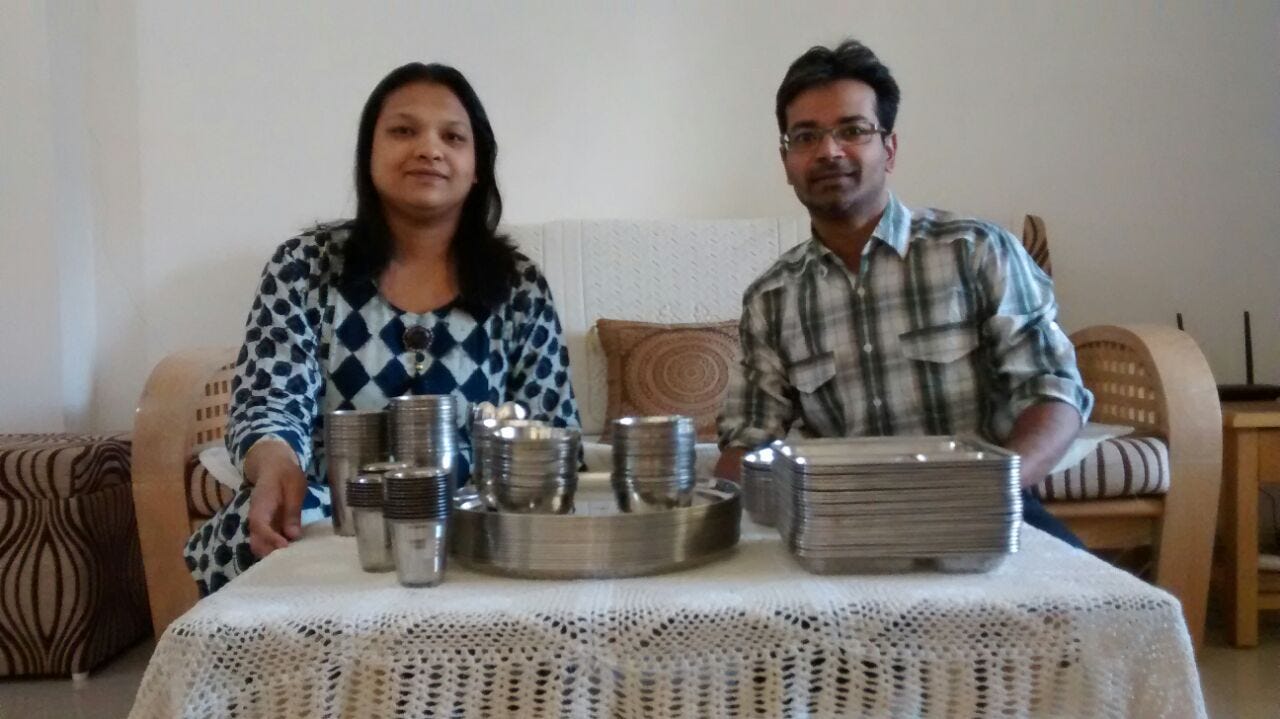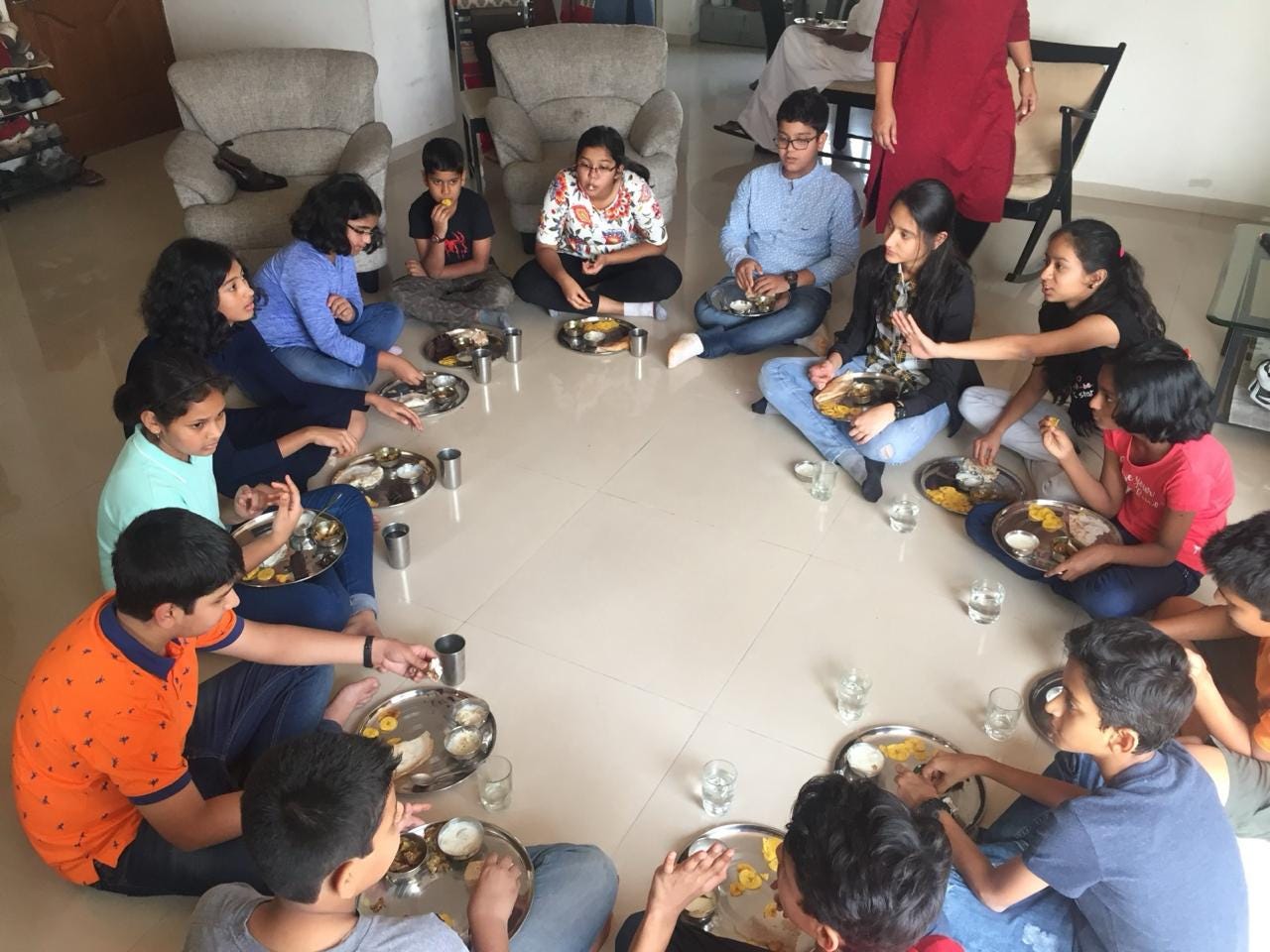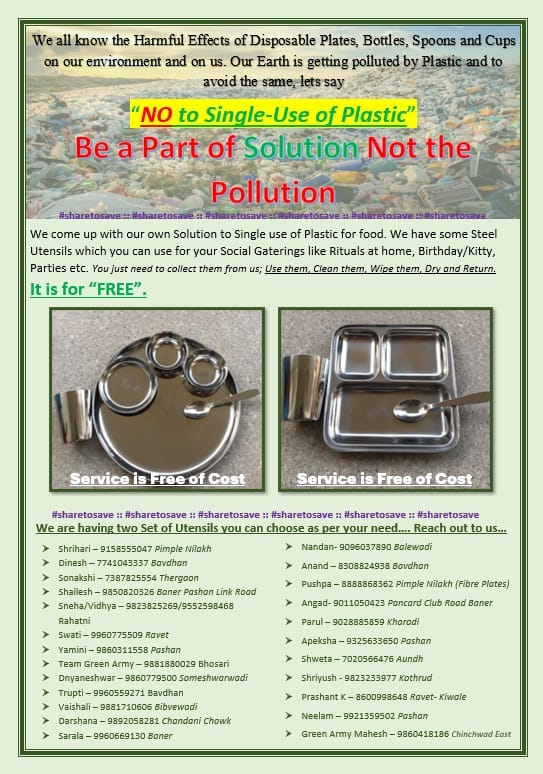Beg, Borrow, Steel?
Steel never ends up as waste. It is durable and it is infinitely recyclable. A citizen group in Pune decided to reuse it infinitely. Meet the Plate Sharing group
You are planning a birthday party at home. The menu is decided. The invitations are sent. The delicious cake is in the making. Everything is set except for a small but very significant detail. How would you serve food to about sixty people? Where do you get 60 dishes, 60 glasses, and spoons?
Of course, the answer is simple. Or rather the answer is just around the corner. A trip to the nearest store will solve the problem in a jiffy. A variety of cutlery is stocked in the shop. Plastic? Paper and foil? Plastic and paper? Areca nut? Baggasse?
You name it and you got it. Biodegradable/ non-biodegradable? All variety!!
What is the issue then? It is all single-use. You use it once and discard it as waste.
Your ecological conscience does not allow you to use single-use plastic or anything, for that matter.
Now, you are in a pickle. You are to serve a party of sixty people, without single-use cutlery. The plates at home with varied shapes and sizes barely make up to fifteen. What about the rest?
The Plate Sharing group is to the rescue!!! If you are based in Pune!!!
Problem Background
Indian culture is all about family and sharing. Family and friends come together to celebrate festivals and life events.
At such gatherings, the leaves made our plates and bowls. Once done, you hurl it in the backyard and let nature take care of it. It was biodegradable. The soil was available in plenty to accommodate it.
Things changed and they changed fast. The bungalows with huge backyards gave way to tall buildings. Parking and paver blocks gobbled up the soil.
The leaf cutlery was replaced by single-use cutlery of plastic, paper, foil, etc. Material changed but our habits did not. The litter, now non-biodegradable began piling up in our landscape.
The waste problem has gained a monumental proportion in urban and rural landscapes with no easy solution at hand.
Why single-use is not a good idea
Single-use articles are the ones that are used only once. Single-use cutlery has two types, biodegradable and non-biodegradable.
Biodegradable articles available are made of areca nut, bagasse, or paper. The non-biodegradable variety is made of plastic, a combination of plastic and paper, or paper and Aluminium.
After being discarded, the biodegradable products can return safely to the soil. The non-biodegradable products remain in the environment for a long time causing pollution.
However, whether biodegradable or non-biodegradable, all the products undergo the same process till they reach us. This process comprises extraction, manufacturing, and distribution. Each step uses resources, consumes energy, and creates pollution. When the product is used for a short while and discarded, the environmental costs associated with resource consumption, energy use, and pollution cannot be justified.
Single-use, whether biodegradable or not, is not a great idea unless the product comes directly from a tree like a banana leaf that grows on sunlight, a renewable energy source.
Challenge with Plastic
As you know plastic is not biodegradable. It does not decompose. It can be recycled only two to three times. The material then deteriorates so much that nothing can be made from it. Hence, recycling is not the permanent solution for plastic.
Plastic articles discarded immediately after use or after two to three recycling rounds end up in the dump yard. Plastic continues to pile up however it does not remain there. It does not decompose but keeps degrading into smaller and smaller particles called microplastic.
Plastic particles less than the size of a sesame seed are called microplastics. Light in weight, these particles easily get carried away with wind and water movement. From the dump yard, they spread everywhere, into the streams, rivers, and oceans. When river water is used for irrigation, microplastic enters the soil and into the crops and vegetables that grow on the soil.
Microplastic has already entered our food chain. It is in the food we eat, it is in the water we drink and it is in the air we breathe. If things continue this way, what would be the situation twenty years from now? What kind of world are we leaving behind for our children?
With these same concerns, the due found the solution to prevent single-use plastic, The Plate Sharing group.
About Plate Sharing Group
Plate sharing group is the idea of Shailesh and Pallavi, a dynamic couple in Pune city who decided to be part of the solution, rather than contribute to pollution. They both are core team members of the organization Vasundhara Swachchta Abhiyaan (VSA) working for the greening and conservation of Pune hills.
This idea was partly inspired by Nipun Mehta's concept of Karma Kitchen and is meant to propagate the idea of trust-based community sharing of resources.
The group was formed in January 2016. Vivek Agarwal was the first person to volunteer for Shailesh and Pallavi's initiative.
Pained by the sight of Pune city drowned in plastic litter, they realized the only way to remove plastic from the environment is not putting it there in the first place.
“Mainly idea was our parties and functions are meant to be about celebration and happiness, but after the party what is left is not happiness, but waste. And that waste becomes someone else's problem. How can we change that. So the motto we followed was "Your parties should spread happiness, not waste". says Shailesh, the co-founder of the group.
Steel cutlery is a solution to the single-use cutlery. It is durable and hence reusable many times over. It withstands rough handling and is easy to clean.
The members each bought about 25 steel Pav-bhaji plates; the ones with compartments, 25 steel spoons, and 25 steel glasses. They spread the word. People planning an event at home began borrowing cutlery from them.
The idea caught on. They created the Plate Sharing WhatsApp group. People joined from all corners of the city.
This is how it works. The person wishing for a zero-waste event drops a message on the group, stating the requirements and area. The people who can fulfill the request, respond. The person collects the required cutlery, uses it, and returns it post-usage. It is expected that the user will responsibly return the cleaned utensils.
Plate Sharing group connects availability and requirement.
Impact
The group has prevented thousands of single-use plastic articles from entering our environment.
The group has fostered a collaborative spirit and created a community around the vision of a clean city. People who borrow from the plate bank, play a role as volunteers too, by taking the trouble of picking up and dropping them back clean.
“Today we have over 25 volunteers stocking up plates, utensils anywhere between 25 to 200 in number. Most volunteers stock plates of various types and sizes(e.g. pavbhaji plates, snack plates, and dinner plates).” shares Pallavi, the co-founder of the group.
Instead of asking people not to go for single-use plastic, the Plate Sharing Group provides a convenient alternative. This solution-oriented approach is what made the idea so powerful.
We appeal to people to copy and replicate the idea.
Join the Plate-Sharing Community
You can be a part of the solution in the following ways:
- You borrow utensils for small functions by reaching out to the donors in the WhatsApp group.
- You can be a donor by starting a small utensil bank at your premises.
- You can spread the word and hopefully enough people will catch the bug and start thinking of solving global problems in small effective local ways.





